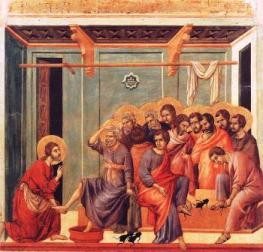 The term “Maunday” or “Maundy” Thursday refers to Christ’s mandate (mandatum) in John 13:34 to His apostles in the service of the Church. It is also called sometimes “Shere” Thursday, perhaps from “shere” indicating “tolerance” and “remedy”, in the sense of “wiggle room”. This “shere” was, according to the OED the difference or error permissible in a measure of something, such as the deviation from the standard in minting a coin.
The term “Maunday” or “Maundy” Thursday refers to Christ’s mandate (mandatum) in John 13:34 to His apostles in the service of the Church. It is also called sometimes “Shere” Thursday, perhaps from “shere” indicating “tolerance” and “remedy”, in the sense of “wiggle room”. This “shere” was, according to the OED the difference or error permissible in a measure of something, such as the deviation from the standard in minting a coin.
COLLECT (2002MR):
Sacratissimam, Deus, frequentantibus Cenam,
in qua Unigenitus tuus, morti se traditurus,
novum in saecula sacrificium
dilectionisque suae convivium Ecclesiae commendavit,
da nobis, quaesumus, ut ex tanto mysterio
plenitudinem caritatis hauriamus et vitae.
This prayer is a new composition for the Novus Ordo. It has nothing of the characteristic Roman concision.
It might have a thin tendril reaching back into the ancient Veronese Sacramentary #96: Uere dignum: qui se ipsum tibi pro nobis offerens immolandum idem sacerdos et sacer agnus exhibuit.
In our Lewis & Short Dictionary we find that frequento is “to visit or resort to frequently, to frequent; to do or make use of frequently, to repeat” and thence more suitably for our purposes, “to celebrate or keep in great numbers, especially a festival”. Haurio is “to tear up, pluck out, draw out, to take to one’s self, take; to swallow, devour, consume, exhaust”.
Commendo is “to commit to one for preservation, protection, etc., to entrust to one’s charge, commit to one’s care, commend to” and “implying a physical delivery, to deposit with, entrust to; constructed with aliquem or aliquid alicui, or absolutely”. Moreover, it is “to commend or recommend, i. e. to procure favor for, to make agreeable, to set off with advantage, to grace”. I was also intrigued by the possibilities in this definition: “Especially, of the dying, to commend children, parents, etc., to the care of others”. You all know about the final commendation of a dying person.
As you work on your own to put this into English, Deus is the subject of the main verb da, and those to whom it is to be granted are found in frequentantibus. Frequentantibus has as its object the Cenam. The whole phrase in qua… commendavit is embedded within that structure.
This prayer, it seems to me, is seriously overworked. It is so self-consciously elegant that it is a challenge to sort out at a single hearing. It becomes a tangled mass, just as when you try to twist up a forkful of spaghetti. If you twist the fork with too many strands at the beginning, after a couple twists you have too much going on and the whole plate starts to move.
LITERAL TRANSLATION
O God, we beg, grant to us attending the most holy Supper
in which Your Only-begotten, about to hand Himself over to death,
commended to Church a new sacrifice unto the ages
and a banquet of His love,
that we may from so great a mystery
drink deeply the fullness of charity and life.
The word haurio gives us the image of Christ’s bitter struggle on Thursday in the garden when faced with the chalice from which He would need to drink.
His bitter draught was our drink of new life. This was the consequence of Christ’s sacrificial love, His perfect charity.
CURRENT ICEL VERSION:
O God, who have called us to participate
in this most sacred Supper,
in which your Only Begotten Son,
when about to hand himself over to death,
entrusted to the Church a sacrifice new for all eternity,
the banquet of his love,
grant, we pray,
that we may draw from so great a mystery,
the fullness of charity and of life.


































“…a sacrifice new for all eternity…”
There really is no need for the inversion of the adjective.
However, to remind us of the bong-and- lovebeads past in which so many of those in power are still mired, the “old ICEL” version is:
“God our Father, we are gathered here to share in the supper which your only Son left to His Church to reveal His love. He gave it to us when He was about to die and commanded it to us to celibrate it as the new and universal sacrifice. We pray that in this Eucharist we may find the fullness of love and life”.
We had this pathetic dreck for over 40 years – 1970 to 2011.